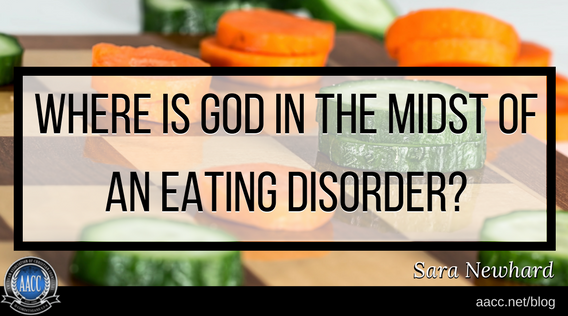Where is God in the Midst of an Eating Disorder?
Where is God in the Midst of an Eating Disorder?
Categories: RECENT RESEARCH

Sara Newhard, M.A.
Want to hear more from Sara? She will be presenting at the 2017 AACC “Break Every Chain” World Conference, which will be held September 27-30 at the Gaylord Opryland Hotel in Nashville, TN. Come hear Sara and hundreds of others at the AACC World Conference! Visit www.worldconference.net to register today!
An eating disorder can have a profound impact on one’s spirituality and can undermine faith leaving a woman wondering about God. We also know that spirituality plays a crucial role in the progression and recovery of an eating disorder.
 Perhaps you are one who is in the midst of this battle with an eating disorder, perhaps you are a parent, spouse, sibling, or close friend of a loved one who is the midst of this battle for their life; or maybe you are a clinician walking alongside a client who is struggling with an eating disorder. This battle is complex, painful, life threatening and yet there is also tremendous hope.
Perhaps you are one who is in the midst of this battle with an eating disorder, perhaps you are a parent, spouse, sibling, or close friend of a loved one who is the midst of this battle for their life; or maybe you are a clinician walking alongside a client who is struggling with an eating disorder. This battle is complex, painful, life threatening and yet there is also tremendous hope.
There is significant evidence that integrating faith and addressing spirituality within the framework of a solid, evidence based eating disorder treatment is powerful. Several common themes that often surface in this complex relationship between an eating disorder and one’s spirituality include interpersonal interactions and connections with others and God as well as issues of worth and identity, suffering, forgiveness, meaning and purpose.
It is well known that family therapy and building healthy social support is a crucial component of eating disorder treatment. As connections with family and friends become healthier, experiences that are profoundly spiritual begin to happen as individuals begin to receive or give compassion, grace, love, and acceptance. These connections also help reduce shame, which is described as the belief that something is inherently wrong with oneself. This perception diminishes in the presence of acceptance, connection, and vulnerability. Therefore, connection with safe, trusted people who authentically and consistently communicate value and worth help individuals to begin to believe that they can receive grace, compassion and love. Overtime, they can learn to extend this same love, grace, and compassion to themselves.
One’s connection with God is also a powerful force. A man or woman may cognitively know that God loves them, and yet have a limited emotional experience of feeling His love or interest in them. Activities that foster this “felt sense” of God’s love and presence may include listening to songs that speak of His love and care, writing Jesus an honest letter about one’s feelings, asking Him questions, and using art as a means of communicating with God.
 Regarding issues of identity, it is often difficult for individuals to see themselves as separate from their eating disorder. This may take many forms such as feeling that their primary identity is that they are “good” at restricting, or perhaps feeling intense shame that they are nothing beyond their binging or purging. They may know that loved ones see so much more in them, but they struggle to believe any other reality. This work around identity may include examining truths such as one’s identity in Christ and highlighting that this truth is based on God’s view of them (articulated in Scripture) and it is not based on the individual’s feelings or others view of them. This work around identity may also include interventions addressing the necessity of receiving and accepting God’s love as an intentional action and decision.
Regarding issues of identity, it is often difficult for individuals to see themselves as separate from their eating disorder. This may take many forms such as feeling that their primary identity is that they are “good” at restricting, or perhaps feeling intense shame that they are nothing beyond their binging or purging. They may know that loved ones see so much more in them, but they struggle to believe any other reality. This work around identity may include examining truths such as one’s identity in Christ and highlighting that this truth is based on God’s view of them (articulated in Scripture) and it is not based on the individual’s feelings or others view of them. This work around identity may also include interventions addressing the necessity of receiving and accepting God’s love as an intentional action and decision.
Suffering and forgiveness are also essential spiritual topics to address in the recovery process. Delving into the work of suffering and pain may include voicing raw pain and honest questions to God and acknowledging how suffering, disappointment, and loss have impacted the individual. Forgiveness towards others can also be challenging (to say the least); often times, it is even more challenging to forgive one’s self. Individuals often hold themselves to a double standard in which they would certainly forgive a friend but have difficulty extending this same forgiveness to themselves. A combination of various interventions may be used to address this forgiveness barrier including examining Scripture about God’s abundant grace and forgiveness, building connections with grace-filled loved ones, and tools for inner healing prayer (such as Sozo or Immanuel Prayer).
 Spiritual issues of meaning and purpose are equally important to explore and to build recovery-focused meaning into the individual’s life. Creating hope for meaning and purpose is one helpful tool; one way this can be done is by having the individual begin to list dreams (big and small) they have for their life. Building recovery-focused meaning and purpose is often a long and painful process as it simultaneously occurs as one is grieving and letting go of the behavior and mindset that fueled the eating disorder. It can be helpful to remember as a clinician or loved one that this process of rediscovering meaning and purpose takes significant energy, patience, perseverance, compassion, kindness, encouragement, and repetition.
Spiritual issues of meaning and purpose are equally important to explore and to build recovery-focused meaning into the individual’s life. Creating hope for meaning and purpose is one helpful tool; one way this can be done is by having the individual begin to list dreams (big and small) they have for their life. Building recovery-focused meaning and purpose is often a long and painful process as it simultaneously occurs as one is grieving and letting go of the behavior and mindset that fueled the eating disorder. It can be helpful to remember as a clinician or loved one that this process of rediscovering meaning and purpose takes significant energy, patience, perseverance, compassion, kindness, encouragement, and repetition.
This brief look at spirituality and eating disorders comes at the risk of oversimplifying the process of recovering from an eating disorder. It is critical to remember that all human beings are body, spirit/mind, and soul. Only looking at one or two facets of the puzzle does a grave and dangerous disservice to our loved ones and clients. Although incredibly complex, comprehensively addressing body, spirit/mind, and soul within the context of an eating disorder holds the hope of a transformed relationship with food, self, others, and the Creator and Savior of the world.
 Sara Newhard, LCPC, LMFT. As the Spirituality and Christian Program Coordinator, Sara leads, supervises and facilitates trainings for the primary and family therapists in the Christian team. She oversees the Christian programming across campus, which includes groups, various worship services and holiday services for residents, and supports the chaplain who serves on campus. Additionally, she supports general spirituality across campus to encourage those of all faiths to nurture their spirit and connect with their Higher Power. Prior to joining Timberline Knolls, Sara worked as a family therapist in the Chicago area where she specialized in multi-systemic therapy for adolescents and their families who were part of the juvenile justice system. Sara also spent several years living and working in Asia before pursuing further education and training in clinical psychology. Sara earned her undergraduate degree in family psychology from Oklahoma Baptist University and her Master’s degree in clinical psychology from Wheaton College in Illinois. Sara is a member of the American Association of Christian Counselors (AACC) and the National Board for Certified Counselors.
Sara Newhard, LCPC, LMFT. As the Spirituality and Christian Program Coordinator, Sara leads, supervises and facilitates trainings for the primary and family therapists in the Christian team. She oversees the Christian programming across campus, which includes groups, various worship services and holiday services for residents, and supports the chaplain who serves on campus. Additionally, she supports general spirituality across campus to encourage those of all faiths to nurture their spirit and connect with their Higher Power. Prior to joining Timberline Knolls, Sara worked as a family therapist in the Chicago area where she specialized in multi-systemic therapy for adolescents and their families who were part of the juvenile justice system. Sara also spent several years living and working in Asia before pursuing further education and training in clinical psychology. Sara earned her undergraduate degree in family psychology from Oklahoma Baptist University and her Master’s degree in clinical psychology from Wheaton College in Illinois. Sara is a member of the American Association of Christian Counselors (AACC) and the National Board for Certified Counselors.
